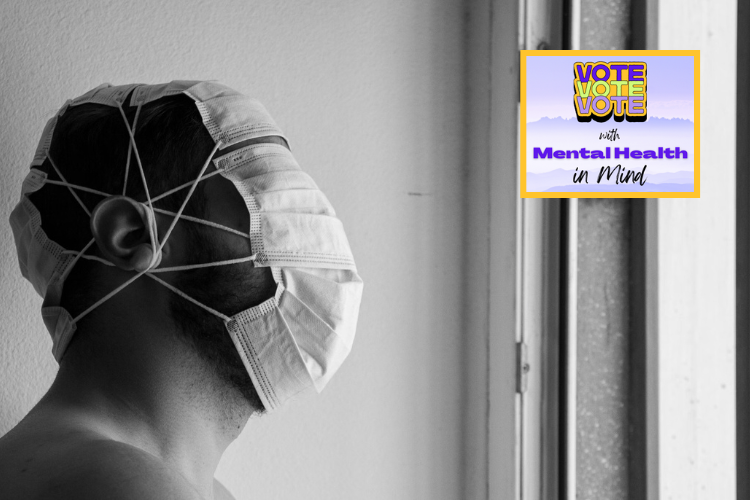By Jeffery Shockley, Prison Journalism Project
A writer serving a life sentence explains the ways restoring voting rights to those incarcerated without parole would aid in rehabilitation and provide valuable perspectives on criminal justice reform
Prior to my life sentence, I was not interested in politics. I cannot remember casting a vote for class secretary in high school, let alone a local public official, a congressman or even the president of the United States, as responsible young adults do.
In the household where I grew up, in the suburbs outside of Philadelphia, we did not speak much about civic responsibility. To my parents and grandparents, voting was a private matter.
On a recent phone call, my mother intimated that Black women voted in secret. “If you should vote for someone another may not agree with,” she said, “you could get beat by the abusive husband or even lose your job.”
Besides the hush-hush nature of politics in my family, I spent much of my time growing up alone. I was raised by my maternal grandmother, who worked often and occasionally overnight. Free to do whatever I wanted, I didn’t spend my time thinking about politics. Instead, I acted out and rarely faced consequences for my actions.
During those years before prison, I saw no need to vote. Those in office were going to do whatever they wanted to whomever they wanted, just like me.
Of course, this naive mindset masked a deep emptiness. To fill it, I became promiscuous. I drank and smoked cigarettes and stole. I turned to drugs. Eventually, in a drug-addled haze, I took someone’s life.
In 1999, at age 37, I was sentenced to life without the possibility of parole (LWOP), also known as death by incarceration.
Pennsylvania is home to the country’s second-largest population of people serving LWOP sentences (5,100 people). Seventy percent of us are Black.
In all of the United States, there are over 55,000 people serving LWOP sentences, a fact that shocks many of our democratic peer nations, where LWOP is rare.
Second-chance opportunities for lifers are scarce in Pennsylvania. In my 25 years inside, I have strived to model good behavior. I have received one misconduct report (it was in 2008 for possessing an extra razor I plead guilty to), and I remain program-compliant.
I have opted to be a person who gives back — by writing, supporting others and training dogs. Otherwise, the death I caused would have been for nothing, and I cannot live with that. Despite my striving to be a “model inmate,” and after waiting five years for a decision about my commutation application, I was recently denied “merit review” with no reason or explanation given.
What a vote for lifers could mean
After 25 years inside, my perspective on voting and politics has changed.
Like in most states, Pennsylvania revokes the right to vote for incarcerated citizens, leaving us with few means of making our voices heard.
In prison, nearly every facet of my external life is controlled by an entity that I have no means of influencing. When and where I sleep is commanded. What I wear and how I should wear it is, too: “Tuck your shirt in!” an officer screams. And I cannot give much thought at all to when or where I shall eat, bathe and even die.

Despite my sincere efforts at transformation, the only thing the prison system sees is the person I was that one fateful day. This is a system that seems to believe some human beings are incapable of rehabilitation and undeserving of redemption.
Restoring the right to vote for lifers would be a small, humane way to return to us some of our agency and dignity. Even though I failed society in the past, I can still help advocate for change. Through the ballot, I could give back in a meaningful way.
Allowing lifers to vote would be a good start to us becoming more active members of society. It would help create vested interest in community leadership and government issues, a necessary step to becoming a responsible citizen. Getting involved with community leaders would break down the “us vs. them” cynicism that is so rampant inside. Voting provides people a voice that matters beyond prison walls, and could help break down negative perceptions, encouraging deeper understanding between free people and imprisoned people.
With the right to vote restored to us, a great civic, spiritual renewal could occur. We could contribute our perspective to important societal conversations and engage our peers inside with more intelligent, meaningful discussions. This would help us reclaim a sliver of the agency we have lost to incarceration. Our experience in the criminal justice system, our knowledge of what works and what doesn’t, could be turned into responsible civic action.
An informed vote
Granting the right to vote to incarcerated people would not necessarily translate to an easier prison life. It would not mean we would all agree. There are people inside who support more stringent laws for offenders and more robust compensation for injuries suffered by victims and survivors of crime. The politics of incarcerated people are more complicated than you might think.
Over my many years inside, I have seen people get a mere slap on the wrist for crimes against children. As a victim of child sexual trauma, I know that it impacts you for the rest of your life. That’s why I believe these crimes should be more severely punished and be met with court-ordered therapy, education and financial compensation to the survivor.
An enfranchised incarcerated community might make society safer overall. It could result in the reinstitution or designing of programs that address the traumas that compelled criminal activity.
Programs currently available take a one-size-fits-all approach that fails to adequately address the wide range of needs of people inside. More enlightened programs could rely on people with life sentences to serve as peer mentors to people working through their past traumas.
It might lower the chance that someone would reoffend. It might help more of us learn, as I did, why we committed our crimes in the first place. At any rate, it would give us a voice in these conversations, and a voice is required to become an active member in the community.
And yes, it might mean that we have a more meaningful way of influencing the system that controls our lives. It might mean voting in politicians who help pass a much-needed medical and geriatric bill to support aging prisoners, or politicians who would help us move our society away from a model that warehouses prisoners until they die.
This story was originally published by Prison Journalism Project.


